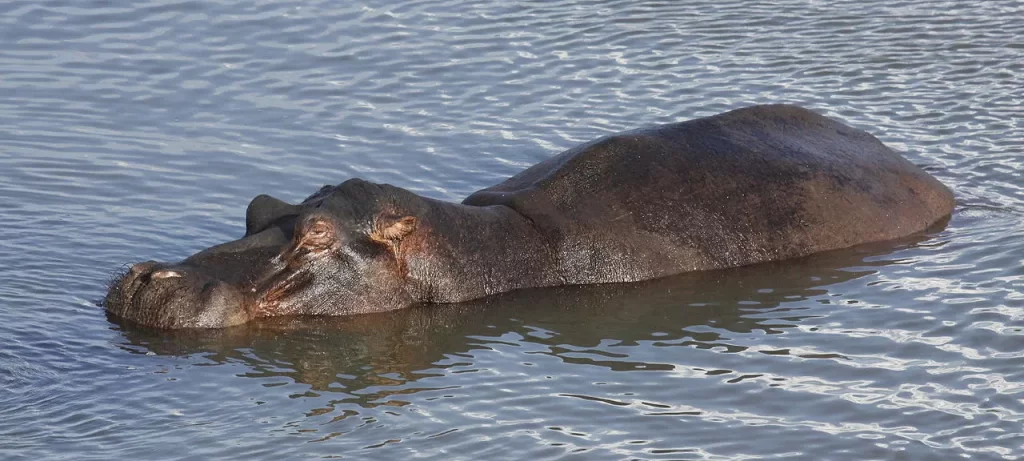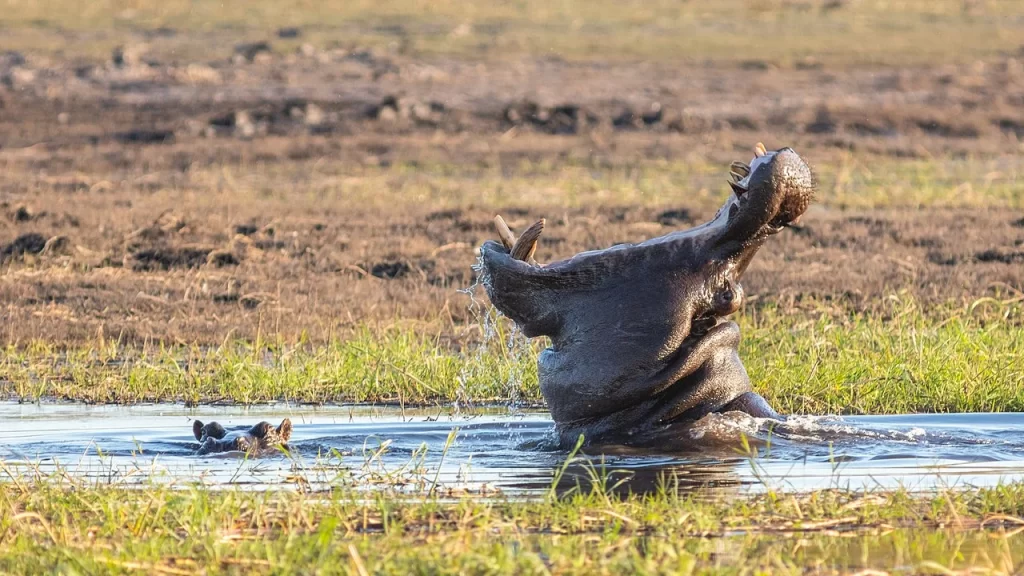Hippos are semi-aquatic: they partially live in water and partially on land. Their massive body weight does not allow them to float or swim through water. They are too dense to swim through water without a streamlined body and fins to propel them. So hippos do not swim, they walk, jog or trot on the river or lake floors or just lie on the shallow ends of the water body. This way, they can have access to both water and land easily. When they need to feed at the river banks and to keep other animals away from their territory.

They can float or sink underwater by controlling their breaths. Hippos stay in water during the day to regulate their body temperature. They can stay in the water for up to 16 hours. Their slightly webbed toes enable them to walk easily in water. Hippos can hold their breath underwater for up to 6 minutes before coming back up to breathe in again. Once they go underwater, hippos can’t swim back up to the surface: they walk underwater till they reach a point in the river or lake that is shallow where they remain submerged.
Their dense bones allow them to remain submerged in water without floating. They have no tails or flippers to help them propel through the water like other animals that live in the same habitat. These special characteristics and adaptations allow hippos to survive better in and underwater.
How Do They Move Through Water?
Hippos mostly prefer to submerge in shallow water with their eyes, nostrils, and ears above the water where they can smell food from a distance, breath, and see anything that invades their territory. This does not mean they cannot stay underwater.
In deep water, hippos move by making a leap from the river bed and do a high springy gallop to the surface. They do not step with their entire feet on the ground but they do so with their toes that are slightly webbed. Their skeleton is graviportal- able to support massive weight- which in return allows them to sink and move underwater effortlessly. Their weight and mass also enable them to withstand the gravity in the water and be able to move in it.

They are also naturally buoyant making it possible for them to move through the water better than on land. They can close their nostrils when they want to go underwater. They have strong rear limbs which capacitate them to kick off from the floor of the river or lake. Their enormous body mass allows them to move at a very high velocity in water which is almost impossible for a normal animal or even human being to do.
Can Hippos Swim In Deep Water?
Deep water includes oceans and hippos are mostly found in shallow water where they stay submerged, but this does not mean they can not stay underwater. They mostly stay in shallow waters because from there they access both the land and water easily and also keep predators and other animals from invading their territory. This is because they are semi-aquatic. They can then breathe, see and hear when they are submerged because their nostrils, eyes, and ears are above the water.

Hippos do not swim in water, they walk and trot under the water. They manage to stay under the water where they use their legs for movement from one point of the water to the other. Hippos can not sink in water since they close their ears and nostrils when they go underwater. They can clearly see underwater because of the clear membrane they have in their eyes which also protects their eyes. They are also able to stay under the water because of their body weight and strong, sturdy legs that act as anchors to hold them down to the river bed.
Nonetheless, hippos can not stay in deep waters for long since they can not swim their way back up to the surface. They might drown and even die when caught in such a situation because they are not able to bop up to the surface and breath.
Hippos are mammals and they are, therefore, not equipped to live in deep water like other species like reptiles, fish, and amphibians. These animal species are specially equipped with organs that enable them to live in water: like fins and gills among many others. Without these special organs, hippos might end up breathing in water and end up drowning.
Very deep waters are not conducive for a hippo to move around especially for an extended period of time.
How Long Can Hippos Hold Their Breath?
Hippos are adapted to living in the water and when they go underwater, they close their nostrils to avoid inhaling water and being at risk of drowning. An adult hippo and a baby hippo hold their breaths differently.
An adult hippo can hold its breath for 5 to 6 minutes while a baby hippo can hold its breath for up to 40 seconds while submerged. This adaptation allows hippos to sleep underwater and come back up to the surface, breathe in and sink back into the water without having to wake up. Their ability to do this is because of their strong and elastic lungs. They are able to shut down their lungs and reactivate them when they come back up to the surface. This is possible because most of their organs are centrally placed and are mostly above the water when they submerge.
Their ability to hold their breath gives them the advantage to live in water unlike any other mammal in the world.
How Fast Can A Hippo Run?

Generally, hippos are among the largest and heaviest mammals on earth with elephants being the heaviest. Their territorial nature makes them attack anyone who crosses their path. Due to their weight, hippos appear to be flabby and slow, but that is not the case. They can easily outrun a human being.
On dry and flat land, hippos can run as fast as 30 km per hour. They gallop by lifting their fore and hind limbs at different intervals. They are known to gain momentum within a very short time. While under the water, hippos can move as fast as 8 km per hour despite the resistance and gravity of the water.
Since hippos do not spend most of their time on land, they do not run very often, but when the need arises they can run as fast as they need to.
